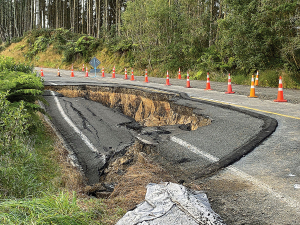Make rural roads a priority.
That's the message from Federated Farmers president Andrew Hoggard in light of massive damage to roads following cyclones Gabrielle and Hale, and other major weather events, especially in the north and east of the North Island.
As Dairy News went to press, some farmers in Hawke's Bay and Tairawhiti were still stranded on their properties, without power and communications. Hoggard says this is unacceptable.
He says the Government needs to rapidly re-prioritise its road funding policies and ensure that people in rural areas are not left stranded for weeks on end.
"Some of the roads are not fit for purpose. Two years ago I went up to Gisborne what struck me was the number of bridges and tenuous roads that, if they go, whole areas would be cut off, which is exactly what has happened now," he told Dairy News.
Hoggard says if the plan is not to put in alternative route options, then the main roads need to be bulletproof and able to withstand major weather events.
He says if people in rural areas don't have options to get to and from their properties, it becomes a very tricky situation. He says lack of access means that stock and other products can't be taken off, milk not collected and essential supplies cannot be brought in.
"It's critical because who would want to live somewhere where, if you have a young family and in an emergency you want to get them out of there, you can't. The thought of being trapped with your family in an event is pretty bloody scary, especially if you have kids or family members with special medical needs," he says.
Hoggard says the risk of poor access means that people are going to think twice about living in rural areas and this could lead to more trees being planting in some places, which he adds is not the greatest.
Hoggard points out the sometimes unrecognised strategic importance of places such as Gisborne and its hinterland in terms of food production, noting its contribution of sheep and beef and fresh vegetables.











